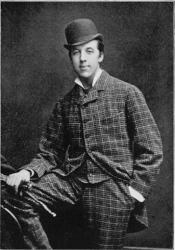Wilde attends Oxford to study classics
Oscar Wilde arrives at Magdalen College, Oxford. After achieving fame and notoriety, Wilde said “the two great turning-points in my life were when my father sent me to Oxford, and when society sent me to prison.” He chose to study classics, describing it as the only subject “where one can be, simultaneously, brilliant and unreasonable.”
Having spent 3 years studying the same subject in Dublin at Trinity College Dublin, he is already well-read and interested in the topic. He quickly became a social butterfly. When asked his age, he would sometimes reduce the number by as much as four years to appear more prodigious. Lying about his age or obscuring his previous university experience helped to emphasize how learned he was and impress classmates. During this time, Wilde had a lecturer named John Ruskin. Ruskin had strong beliefs that if labor and artistry were combined and everyone contributed, beauty would result and there wouldn’t be such an extreme hierarchy of labor in society. Wilde recounted that what he learned from Ruskin was “that in all labour there is something noble. Ruskin recruited Wilde and other undergraduates to undertake a project to connect two separated rural towns with a beautiful and functional road. The group gathered every morning for the duration of the term to create the road, but the project was never finished. Wilde used this experience as inspiration to create a new artistic movement. In his final year at Magdalen College, Wilde met Walter Pater. Wilde sent Pater an article he had published and explained that he was a fan of The Renaissance. Pater and Wilde occasionally spent time together over tea, and their casual friendship had a large influence on Wilde going forward, as he echoed Pater’s ideas with witty prose. Upon graduation from Magdalen College, Wilde received a “double first,” which is given to students who achieve First Class Honors in two areas of study. He graduated in 1878.

